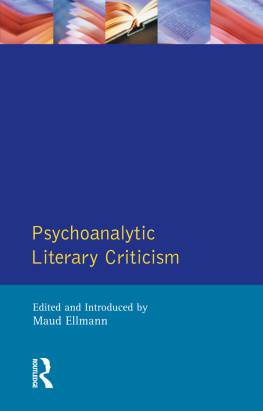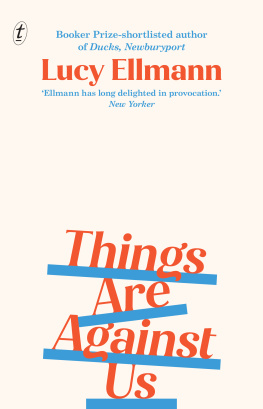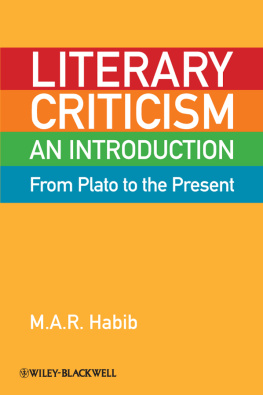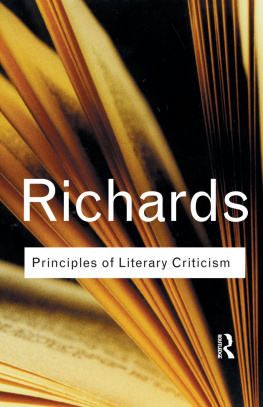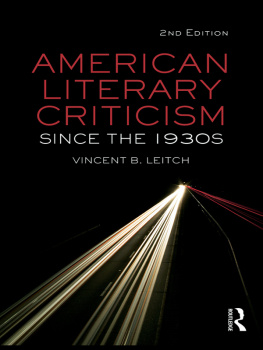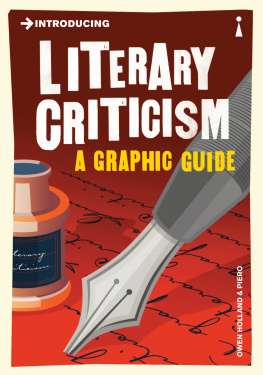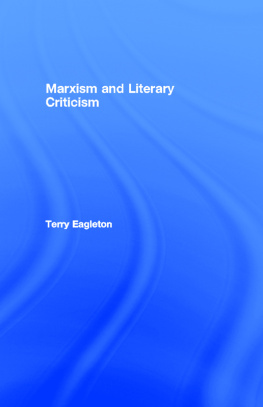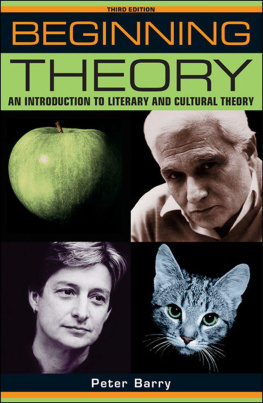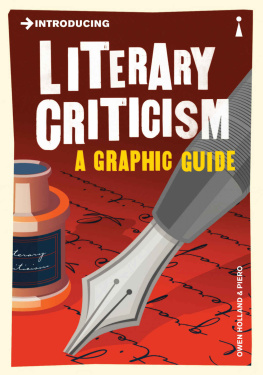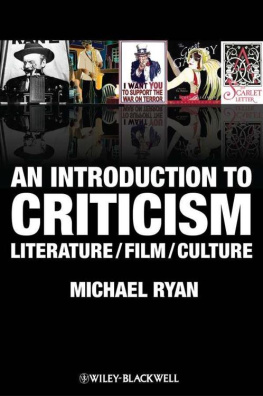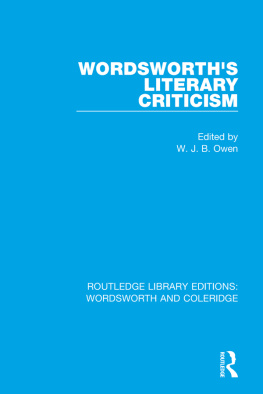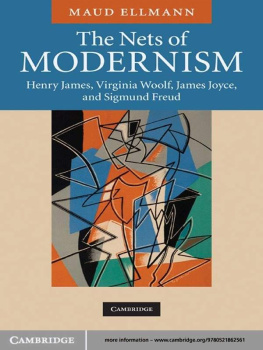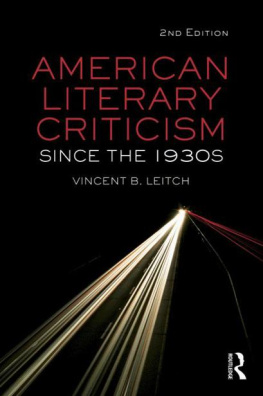Ellmann - Psychoanalytic Literary Criticism
Here you can read online Ellmann - Psychoanalytic Literary Criticism full text of the book (entire story) in english for free. Download pdf and epub, get meaning, cover and reviews about this ebook. publisher: Taylor and Francis, genre: Home and family. Description of the work, (preface) as well as reviews are available. Best literature library LitArk.com created for fans of good reading and offers a wide selection of genres:
Romance novel
Science fiction
Adventure
Detective
Science
History
Home and family
Prose
Art
Politics
Computer
Non-fiction
Religion
Business
Children
Humor
Choose a favorite category and find really read worthwhile books. Enjoy immersion in the world of imagination, feel the emotions of the characters or learn something new for yourself, make an fascinating discovery.
- Book:Psychoanalytic Literary Criticism
- Author:
- Publisher:Taylor and Francis
- Genre:
- Rating:4 / 5
- Favourites:Add to favourites
- Your mark:
- 80
- 1
- 2
- 3
- 4
- 5
Psychoanalytic Literary Criticism: summary, description and annotation
We offer to read an annotation, description, summary or preface (depends on what the author of the book "Psychoanalytic Literary Criticism" wrote himself). If you haven't found the necessary information about the book — write in the comments, we will try to find it.
Ellmann: author's other books
Who wrote Psychoanalytic Literary Criticism? Find out the surname, the name of the author of the book and a list of all author's works by series.
Psychoanalytic Literary Criticism — read online for free the complete book (whole text) full work
Below is the text of the book, divided by pages. System saving the place of the last page read, allows you to conveniently read the book "Psychoanalytic Literary Criticism" online for free, without having to search again every time where you left off. Put a bookmark, and you can go to the page where you finished reading at any time.
Font size:
Interval:
Bookmark:
PSYCHOANALYTIC LITERARY CRITICISM
LONGMAN CRITICAL READERS
General Editor:
STAN SMITH, Professor of English, University of Dundee
Published titles:
K. M. NEWTON, George Eliot
MARY EAGLETON, Feminist Literary Criticism
GARY WALLER, Shakespeares Comedies
JOHN DRAKAKIS, Shakespearean Tragedy
RICHARD WILSON AND RICHARD DUTTON, New Historicism and Renaissance Drama
PETER BROOKER, Modernism/Postmodernism
PETER WIDDOWSON, D. H. Lawrence
RACHEL BOWLBY, Virginia Woolf
FRANCIS MULHERN, Contemporary Marxist Literary Criticism
ANNABEL PATTERSON, John Milton
CYNTHIA CHASE, Romanticism
MICHAEL ONEILL, Shelley
STEPHANIE TRIGG, Medieval English Poetry
ANTONY EASTHOPE, Contemporary Film Theory
TERRY EAGLETON, Ideology
MAUD ELLMANN, Psychoanalytic Literary Criticism
PSYCHOANALYTIC LITERARY CRITICISM

Edited and Introduced by
MAUD ELLMANN

First published 1994 by Longman Group Limited
Published 2013 by Routledge
2 Park Square, Milton Park, Abingdon, Oxon OX14 4RN
711 Third Avenue, New York, NY 10017, USA
Routledge is an imprint of the Taylor & Francis Group, an informa business
Copyright 1994, Taylor & Francis.
All rights reserved. No part of this book may be reprinted or reproduced or utilised in any form or by any electronic, mechanical, or other means, now known or hereafter invented, including photocopying and recording, or in any information storage or retrieval system, without permission in writing from the publishers.
Notices
Knowledge and best practice in this field are constantly changing. As new research and experience broaden our understanding, changes in research methods, professional practices, or medical treatment may become necessary.
Practitioners and researchers must always rely on their own experience and knowledge in evaluating and using any information, methods, compounds, or experiments described herein. In using such information or methods they should be mindful of their own safety and the safety of others, including parties for whom they have a professional responsibility
To the fullest extent of the law, neither the Publisher nor the authors, contributors, or editors, assume any liability for any injury and/or damage to persons or property as a matter of products liability, negligence or otherwise, or from any use or operation of any methods, products, instructions, or ideas contained in the material herein.
ISBN 13: 978-0-582-08347-9 (pbk)
British Library Cataloguing-in-Publication Data
A catalogue record for this book is
available from the British Library
Library of Congress Cataloging-in-Publication Data
Psychoanalytic literary criticism/edited and introduced by Maud Ellmann.
p. cm.(Longman critical readers)
Includes bibliographical references and index.
ISBN 0582083486 (CSD).ISBN 0582083478 (PPR)
1. Psychoanalysis and literature. 2. Criticism. I. Ellmann, Maud, 1954. II. Series.
PN56.P92P725 1994
801.92dc20 941983
CIP
The outlines of contemporary critical theory are now often taught as a standard feature of a degree in literary studies. The development of particular theories has seen a thorough transformation of literary criticism. For example, Marxist and Foucauldian theories have revolutionised Shakespeare studies, and deconstructin has led to a complete reassessment of Romantic poetry. Feminist criticism has left scarcely any period of literature unaffected by its searching critiques. Teachers of literary studies can no longer fall back on a standardised, received, methodology.
Lecturers and teachers are now urgently looking for guidance in a rapidly changing critical environment. They need help in understanding the latest revisions in literary theory, and especially in grasping the practical effects of the new theories in the form of theoretically sensitised new readings. A number of volumes in the series anthologise important essays on particular theories. However, in order to grasp the full implications and possible uses of particular theories it is essential to see them put to work. This series provides substantial volumes of new readings, presented in an accessible form and with a significant amount of editorial guidance.
Each volume includes a substantial introduction which explores the theoretical issues and conflicts embodied in the essays selected and locates areas of disagreement between positions. The pluralism of theories has to be put on the agenda of literary studies. We can no longer pretend that we all tacitly accept the same practices in literary studies. Neither is a laissez-faire attitude any longer tenable. Literature departments need to go beyond the mere toleration of theoretical differences: it is not enough merely to agree to differ; they need actually to stage the differences openly. The volumes in this series all attempt to dramatise the differences, not necessarily with a view to resolving them but in order to foreground the choices presented by different theories or to argue for a particular route through the impasses the differences present.
The theory revolution has had real effects. It has loosened the grip of traditional empiricist and romantic assumptions about language and literature. It is not always clear what is being proposed as the new agenda for literary studies, and indeed the very notion of literature is questioned by the post-structuralist strain in theory. However, the uncertainties and obscurities of contemporary theories appear much less worrying when we see what the best critics have been able to do with them in practice. This series aims to disseminate the best of recent criticism and to show that it is possible to re-read the canonical texts of literature in new and challenging ways.
RAMAN SELDEN AND STAN SMITH
The Publishers and fellow Series Editor regret to record that Raman Selden died after a short illness in May 1991 at the age of fifty-three. Ray Selden was a fine scholar and a lovely man. All those he has worked with will remember him with much affection and respect.
I should like to thank my husband, Chris Baldick, for his generous help throughout this project.
We are grateful to the following for permission to reproduce copyright material;
Cambridge University Press for extracts from the article The Psycho-analytic Reading of Tragedy prologue to The Tragic Effect: The Oedipus Complex in Tragedy by Andr Green, translated by Alan Sheridan (1979); Columbia University Press for the chapter Gerard de Nerval, the Disinherited Poet from Black Sun: Depression and Melancholia by Julia Kristeva, translated by Leon S. Roudiez (1989), Columbia University Press; Faber and Faber Ltd and HarperCollins Publishers, Inc. for the poem Daddy from Ariel by Sylvia Plath, 1963 by Ted Hughes; Johns Hopkins University Press for extracts from the article Oedipal Textuality: Reading Freuds Reading of Oedipus from Decomposing Figures: Rhetorical Readings in the Romantic Tradition by Cynthia Chase (1986) and extracts from Beyond Oedipus: The Specimen Story of Psychoanalysis by Shoshana Felman from Lacan and Narration: The Psychoanalytic Difference in Narrative Theory edited by Robert Con Davis (1983); The MIT Press for the chapter Two Ways to Avoid the Real of Desire: The Sherlock Holmes Way from Looking Awry: An Introduction to Jacques Lacan Through Popular Culture
Next pageFont size:
Interval:
Bookmark:
Similar books «Psychoanalytic Literary Criticism»
Look at similar books to Psychoanalytic Literary Criticism. We have selected literature similar in name and meaning in the hope of providing readers with more options to find new, interesting, not yet read works.
Discussion, reviews of the book Psychoanalytic Literary Criticism and just readers' own opinions. Leave your comments, write what you think about the work, its meaning or the main characters. Specify what exactly you liked and what you didn't like, and why you think so.

